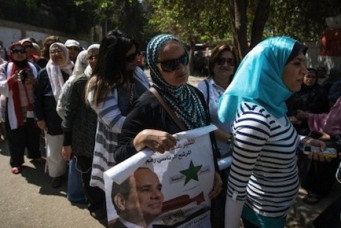Witness to an Election, and to History
Ayman Mohammed Abdel Sabour is a lawyer from Alexandria and a member of the I Am Egyptian Association for Development and Human Rights. It is a warm spring evening, and we are both official observers for the 2012 Egyptian presidential election. He and I are in the Nile Delta city of Damanhour, standing in the city’s cultural center where votes from polling stations in two of the Behera governorate’s fifteen districts are being aggregated. There are a few journalists here as well, watching a team of senior judges tally the figures under military protection.
Ayman Mohammed Abdel Sabour is a lawyer from Alexandria and a member of the I Am Egyptian Association for Development and Human Rights. It is a warm spring evening, and we are both official observers for the 2012 Egyptian presidential election. He and I are in the Nile Delta city of Damanhour, standing in the city’s cultural center where votes from polling stations in two of the Behera governorate’s fifteen districts are being aggregated. There are a few journalists here as well, watching a team of senior judges tally the figures under military protection.
Sabour served as a domestic election observer for more than a decade during President Hosni Mubarak’s reign. He can hardly believe the difference between those years and our shared experience today. “You should have been here in 2010,” he whispers to me, referring to the fraudulent parliamentary election that triggered widespread anger and helped ignite the January 25, 2011, revolution. “We know what is going on now. You can see the organization. Back then, you had to fight to get in here, and you never knew who might change the numbers from behind the stage. Intimidation was everywhere.”
Little did I imagine when I arrived in Egypt in 2010 to pursue a master’s degree in Middle East Studies at the American University in Cairo that I would not only witness a revolution against Mubarak’s thirty-year rule, but would also have the opportunity to serve as an observer in an election to choose his successor. Early in May, an international organization selected me to join its team of more than a hundred witnesses from thirty-six countries. In Cairo, my fellow observers and I underwent two days of intense, Egypt-specific training from their legal, security, and elections experts.
Independent monitoring plays a vital role in conferring credibility on the results of elections, a function that is especially important in countries experiencing contested political transitions. Egypt’s Supreme Presidential Electoral Commission (SPEC) accredited Sabour’s group and many others like it, including a number of foreign organizations, to observe the May and June election rounds. Our job was to watch an election process involving some fifty-three million registered voters and 13,099 polling stations. We met with military, judicial, and candidate representatives and visited roughly twenty-five to thirty polling centers during each round, observing candidates’ campaigns, preparations for election days, and the voting itself.
Our mission did experience limitations due to SPEC placing some restrictions, which undermined the credibility and effectiveness of the concept of election observation. These included the late issuance of accreditation (less than a week prior to first-round voting), a provision that we, the witnessing missions, could not issue statements prior to polling, a 30-minute time limit inside polling stations, and a prohibition on being present during the final aggregation of the votes in Cairo. Generally, however, our mission found that the June 16–17 voting and counting process was free from major flaws that might have benefited one candidate or the other. But we noted that the earlier dissolution of the Egyptian parliament, the proposed reintroduction of elements of martial law, and the intervention of the military into the constitution-writing process had called the meaningfulness of the election into question.
Nevertheless, the way the electoral process was embraced by millions of voters―and by Egyptian election observers like Sabour―is impressive. And Sabour’s enthusiasm contrasts sharply with the cynicism and dejection that prevailed among citizens only two years ago. That, in itself, is an important step forward.
Subscribe to Our Newsletter



